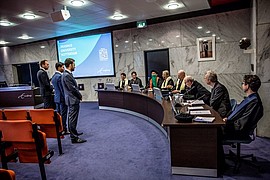PhD Defence: Rumen Pozharliev

In his dissertation ‘Social Neuromarketing: The Role of Social Context in Measuring Advertising Effectiveness’ ERIM’s Rumen Pozharliev focuses on the influence of social context on consumers’ cognitive responses to marketing stimuli.
Rumen defended his dissertation in the Senate Hall at Erasmus University Rotterdam on Thursday, 23 February 2017 at 13:30. His supervisor was Prof. Willem Verbeke and his co-supervisor was Prof. Jan van Strien. Other members of the Doctoral Committee were Prof. Frank Belschak (University of Amsterdam), Prof. Stefano Puntoni (Erasmus University), Prof. Richard Bagozzi (University of Michigan), Prof. Bas Donkers (Erasmus University) and Dr Ruud van den Bos (Radboud University)
About Rumen Pozharliev

Rumen Pozharliev was born on January 7, 1983 in Plovdiv, Bulgaria. He obtained his undergraduate degree, il Triennio (a 3-year degree), in Economics of International Markets and New Technologies (CLEMIT), from Bocconi University, Milan, Italy in 2006. After finishing his undergraduate degree, Rumen started, together with a friend, an import and retail business, based in his hometown. In 2010, he decided to move to Rotterdam and complete a Master of Science in Economics and Business, majoring in Marketing, at the Erasmus University Rotterdam (cum laude).
In August 2012, Rumen started his Ph.D. at the department of Economics and Business (Marketing) of the Erasmus School of Economics. During his Ph.D., Rumen taught in Neuromarketing and Branding at the Erasmus School of Economics. Rumen’s research interests include advertising effectiveness, social neuroscience, and neuromarketing. In particular, Rumen applies neurophysiological and biological methods to understand the influence of different social processes, such as mere presence, on the neural and biological systems involved in cognitive processes, such as attention and memory, related to advertising effectiveness.
Rumen’s work has been published in Journal of Marketing Research and Frontiers in Human Neuroscience. In May 2016, Rumen presented his work at the European Marketing Academy Conference (EMAC) hosted by Norwegian Business School (BI), Oslo, Norway. In addition to his research, he also supervised many master thesis projects. Next to his academic activities, Rumen maintains a strong passion for football and occasionally visits the home games of his favourite team Juventus, Turin.
Thesis Abstract

In this dissertation, I focus on the influence of social context on consumers’ cognitive responses to marketing stimuli. Specifically, I examine the interaction between cortical brain activity, attachment styles and genetic makeup in different social settings. First, I examine the interaction between cortical brain activity and attachment styles in task-free resting-state condition. My goal is to study the effects of social context on cortical brain activity in ad-free environment. I find that social context affects task-free resting-state cortical brain activity and that this effect is modulated by participant’s attachment style. The results suggest increased tonic alertness that is required for more active introspective processes in the social compared to alone condition. Second, I study cortical brain responses to advertising in non-interactive social situation. I find increased attention allocation and motivational significance, both enhanced by the presence of another person, to pictures of luxury branded products. These results suggest that social context enhances customer engagement because of increased nondirective arousal, such as nonspecific attention engagement with branded products. In retail settings, the mere presence of consumers in places where shoppers congregate may amplify feelings of pleasure, joy, and desire. Third, I investigate the interaction between cortical brain activity and participant’s genetic makeup in sales-consumer settings. I find increased socially motivated attention during preference inferences from eye-related cues as opposed to passive viewing of branded products for the GG compared to A-allele carrier individuals. This implies that someone’s genetic makeup can affect his socially motivated behavior. Finally, I argue that marketers who aim to understand and predict advertising effectiveness can benefit from placing participants in social settings in addition to the traditional manner of studying consumer brain responses to marketing-relevant stimuli in social isolation.
Photos: Chris Gorzeman / Capital Images


